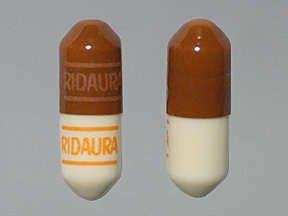Auranofin Side Effects
Medically reviewed by Drugs.com. Last updated on Jun 10, 2024.
Applies to auranofin: oral capsule.
Important warnings
This medicine can cause some serious health issues
You should not use auranofin if you have ever had a severe reaction to gold therapy that affected your skin, lungs, bone marrow, blood cells, or your stomach or intestines.
Auranofin contains gold, which may be toxic and can cause symptoms such as rash, itching, mouth sores, or blood in your urine, or severe diarrhea.
Call your doctor at once if you have a severe skin rash or itching, mouth sores, severe diarrhea, pale skin, unusual tiredness, easy bruising or bleeding, blood in your urine or stools, or if you cough up blood.
Get emergency medical help if you have signs of an allergic reaction: hives; difficult breathing; swelling of your face, lips, tongue, or throat.
Call your doctor at once if you have:
-
pale skin, easy bruising, unusual bleeding (nosebleeds, bleeding gums), purple or red spots under your skin;
-
unusual tiredness, feeling short of breath;
-
severe skin rash or itching;
-
sudden chest pain, wheezing, dry cough, feeling short of breath;
-
severe or ongoing diarrhea, nausea, vomiting, or loss of appetite;
-
black, bloody, or tarry stools; or
-
kidney problems--puffy eyes, swelling in your ankles or feet, blood in your urine, urine that looks foamy.
Auranofin may cause more side effects on the stomach than gold injections cause. If you were switched from gold injections to auranofin capsules, tell your doctor if you have concerns about these side effects. You may need to use auranofin for a few months before your symptoms improve.
Common side effects may include:
-
diarrhea, loose stools;
-
rash, itching; or
-
blisters or ulcers in your mouth, red or swollen gums, trouble swallowing.
This is not a complete list of side effects and others may occur. Call your doctor for medical advice about side effects.
See also:
For healthcare professionals
Applies to auranofin: oral capsule.
Gastrointestinal adverse events
- Very common (10% or more): Diarrhea/loose stools (47%), abdominal pain (14%),
- Common (1% to 10%): %), Constipation, anorexia, flatulence, dyspepsia, dysgeusia, glossitis, gingivitis
- Uncommon (0.1% to 1%): GI bleeding, melena, blood in stool, ulcerative enterocolitis
- Rare (less than 0.1%): Dysphagia
- Frequency not reported: Metallic taste, dry mucus membrane, inflammatory bowel disease[Ref]
stomatitis (may be manifested by shallow ulcers on the buccal membranes, on the borders of the tongue, and on the palate or in the pharynx) (13%), nausea/vomiting (10%)
Dermatologic
- Very common (10% or more): Rash (24%), pruritus (17%), dermatitis
- Common (1% to 10%): Alopecia, urticaria
- Frequency not reported: Photosensitivity, exfoliative dermatitis, chrysiasis[Ref]
Ocular
- Common (1% to 10%): Conjunctivitis
- Rare (less than 0.1%): Gold deposits in the lens or cornea unassociated clinically with eye disorders or visual impairment
- Frequency not reported: Corneal lesion[Ref]
Hematologic
- Common (1% to 10%): Thrombocytopenia, anemia, leukopenia, eosinophilia
- Uncommon (0.1% to 1%): Neutropenia
- Rare (less than 0.1%): Aplastic anemia, agranulocytosis, pure red cell aplasia, pancytopenia[Ref]
Renal
Hepatic
Respiratory
- Rare (0.01% to 0.1%): Bronchitis, interstitial pneumonitis, fibrosis
- Frequency not reported: Progression of preexisting pulmonary disease[Ref]
Nervous system
- Rare (less than 0.1%): Peripheral neuropathy
- Frequency not reported: Headache, dizziness, Bell's palsy[Ref]
Other
- Frequency not reported: Ototoxicity[Ref]
References
1. (2001) "Product Information. Ridaura (auranofin)." SmithKline Beecham
2. Cerner Multum, Inc. "Australian Product Information."
More about auranofin
- Check interactions
- Compare alternatives
- Reviews (2)
- Drug images
- Dosage information
- During pregnancy
- Drug class: antirheumatics
- Breastfeeding
- En español
Patient resources
Other brands
Professional resources
Other brands
Related treatment guides
Further information
Auranofin side effects can vary depending on the individual. Always consult your healthcare provider to ensure the information displayed on this page applies to your personal circumstances.
Note: Medication side effects may be underreported. If you are experiencing side effects that are not listed, submit a report to the FDA by following this guide.

